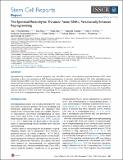The Epithelial-Mesenchymal Transition Factor SNAIL Paradoxically Enhances Reprogramming
Author(s)
Unternaehrer, Juli J.; Zhao, Rui; Kim, Kitai; Cesana, Marcella; Powers, John T.; Ratanasirintrawoot, Sutheera; Onder, Tamer T.; Shibue, Tsukasa; Weinberg, Robert A.; Daley, George Q.; Weinberg, Robert A; ... Show more Show less
DownloadUnternaehrer-2014-The Epithelial-Mesen.pdf (1.736Mb)
PUBLISHER_CC
Publisher with Creative Commons License
Creative Commons Attribution
Terms of use
Metadata
Show full item recordAbstract
Reprogramming of fibroblasts to induced pluripotent stem cells (iPSCs) entails a mesenchymal to epithelial transition (MET). While attempting to dissect the mechanism of MET during reprogramming, we observed that knockdown (KD) of the epithelial-to-mesenchymal transition (EMT) factor SNAI1 (SNAIL) paradoxically reduced, while overexpression enhanced, reprogramming efficiency in human cells and in mouse cells, depending on strain. We observed nuclear localization of SNAI1 at an early stage of fibroblast reprogramming and using mouse fibroblasts expressing a knockin SNAI1-YFP reporter found cells expressing SNAI1 reprogrammed at higher efficiency. We further demonstrated that SNAI1 binds the let-7 promoter, which may play a role in reduced expression of let-7 microRNAs, enforced expression of which, early in the reprogramming process, compromises efficiency. Our data reveal an unexpected role for the EMT factor SNAI1 in reprogramming somatic cells to pluripotency.
Date issued
2014-10Department
Massachusetts Institute of Technology. Department of Biology; Whitehead Institute for Biomedical Research; Ludwig Center for Molecular Oncology (Massachusetts Institute of Technology)Journal
Stem Cell Reports
Publisher
Elsevier
Citation
Unternaehrer, Juli J., Rui Zhao, Kitai Kim, Marcella Cesana, John T. Powers, Sutheera Ratanasirintrawoot, Tamer Onder, Tsukasa Shibue, Robert A. Weinberg, and George Q. Daley. “The Epithelial-Mesenchymal Transition Factor SNAIL Paradoxically Enhances Reprogramming.” Stem Cell Reports 3, no. 5 (November 2014): 691–698.
Version: Final published version
ISSN
22136711